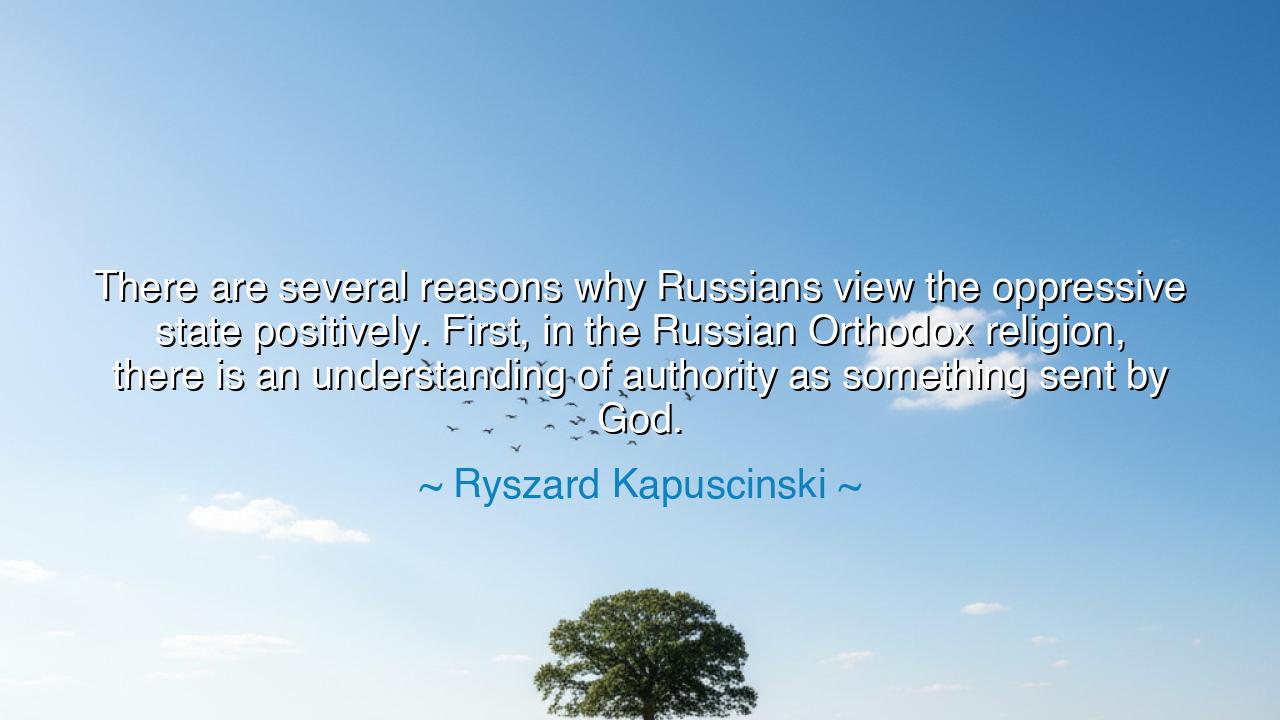
There are several reasons why Russians view the oppressive state
There are several reasons why Russians view the oppressive state positively. First, in the Russian Orthodox religion, there is an understanding of authority as something sent by God.






Ryszard Kapuściński, the great observer of nations and their souls, declared with clarity: “There are several reasons why Russians view the oppressive state positively. First, in the Russian Orthodox religion, there is an understanding of authority as something sent by God.” These words unveil a truth rooted deep in the soil of history—that the Russian people, long accustomed to hardship, have often embraced the power of the state not merely as an earthly force, but as a divine mandate. In this vision, rulers are not merely kings or tsars; they are agents of heaven, cloaked in sacred authority, and to obey them is to obey the will of God.
The ancients, too, taught of such mysteries. Pharaohs of Egypt claimed descent from the gods, demanding obedience as holy duty. Emperors of Rome declared themselves divinely chosen, their decrees as sacred as scripture. So too in the land of the Rus, the Orthodox faith intertwined with monarchy, declaring the tsar to be “God’s anointed.” From cradle to grave, the people were taught that authority was not accidental but providential, that to resist the state was to resist the divine order itself. Thus was born a culture where submission was not weakness, but virtue; endurance under oppression was not only survival, but sanctification.
Consider the tale of Ivan the Terrible. Though his reign was marked by violence, tyranny, and blood, many still revered him as chosen by God to guard the Russian soul against enemies within and without. The Orthodox Church sanctified his authority, and his people, bound by faith and fear, bore his cruelty as though it were part of the divine design. Here we see the paradox Kapuściński unveils: that oppression, when dressed in the garments of faith, can appear not as a curse but as a blessing, not as bondage but as holy order.
And yet, O listener, do not imagine this is peculiar only to Russia. The same pattern recurs wherever faith sanctifies power without question. When men are taught that rulers are chosen by heaven, rebellion becomes sacrilege, obedience becomes salvation. Thus, tyrannies are not upheld by swords alone, but by hearts persuaded that to resist is sin. Kapuściński’s insight is not merely about Russia—it is about the eternal danger of mingling the sacred with the state, where earthly power cloaks itself in divine right.
But behold the irony: even under oppression, the Russian people found strength. Through centuries of tsars and commissars, of prisons and gulags, they endured with a resilience that astonished the world. Their faith, though used to justify their chains, also gave them hope to survive them. The same religion that sanctified authority also whispered of justice and resurrection. Thus, within the paradox of faith and power lay both submission and endurance, both bondage and spiritual strength.
The lesson shines clear for all generations: question any authority that declares itself divine. Respect faith, but beware when it is wielded as a tool of rulers. True religion uplifts, liberates, and defends the weak; false religion justifies oppression and crowns tyranny with sacred oil. To accept authority blindly is to risk becoming complicit in injustice; to honor the sacred while questioning the state is the path of wisdom and courage.
Practical wisdom flows from this: in your own life, examine the voices that call you to obedience. Ask: does this command serve justice, mercy, and truth—or does it serve only power? When you honor leaders, do so not because they claim divine right, but because they act with righteousness. And when you practice faith, let it lead you not into submission to cruelty, but into strength, compassion, and the defense of what is good.
So let this be your inheritance, O children of tomorrow: authority is not always a gift from God, even if men cloak it in sacred words. Discern with wisdom, obey with conscience, and stand firm when power demands what love forbids. For life is not given to serve tyrants, but to honor truth—and truth, though crushed, will always rise again.






AAdministratorAdministrator
Welcome, honored guests. Please leave a comment, we will respond soon